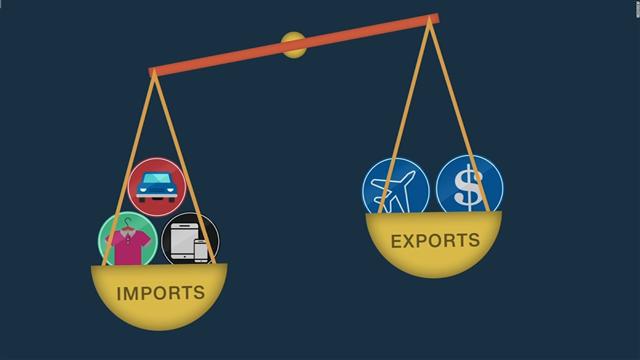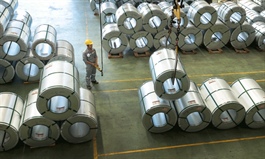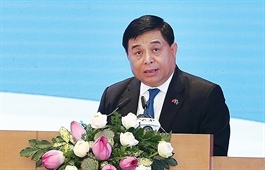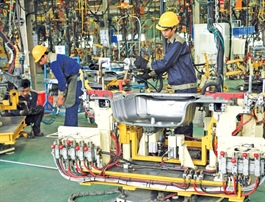Trade deficit with Vietnam impossible to handle
Trade deficit with Vietnam impossible to handle
Analysts were not surprised that Vietnam was labeled with the tag of currency manipulator by the US Department of the Treasury. Vietnam was already on the watch list, along with ten other countries/territories, namely, India, Thailand, Taiwan, China, Japan, South Korea, Germany, Italy, Singapore, and Malaysia.
Illustrative photo.
|
Labeling too rigid
According to Mr. Mark Sobel, who worked for the US Treasury and IMF, this labeling of a tag as a currency manipulator is too mechanical and rigid as it does not consider objective factors. For example, in the case of Switzerland, during the Covid-19 pandemic, the CHF was considered a safe asset, so the capital inflow was large. In the case of Vietnam, a strong inflow of FDI in 2019 was due to the US-China trade war.
Among the three criteria for being labeled a currency manipulator, there are two criteria that Vietnam can handle technically, namely, current balance surplus and intervention in the foreign currency market. First, Vietnam's current account surplus figure in 2019 was 5% of GDP, about USD 13 bn. If GDP is recalculated according to the IMF, the current account surplus in 2019 will be 3.95%. Along with fluctuation of economy in 2020, the IMF forecasts that this index will be lower than the threshold of 2% for 2020.
Second, to intervene in the foreign currency market there is a way like Taiwan used, which is to use derivative financial products to buy foreign currency. Although these tricks are known to the US Treasury Department, but to intervene in the forex market, other formal tricks can still be used, as also informal shadow channels. Third, only the first criterion of a trade deficit with Vietnam is almost impossible to handle, and this is probably the main concern of the US. During the last ten years, the US export trade deficit with Vietnam has steadily been increasing each year. In the first ten months of 2020 alone, the net import of goods from Vietnam to the US were at USD 56.62 bn, 4.3 times higher than in 2011. In 2019, trade deficit skyrocketed by 41.25% from USD 39.48 bn to USD 55.76 bn (illustration).
The US-China trade war is one of the main causes for the shifting of factories from China to Vietnam. However, in addition, it must also be mentioned that China actively moved up a higher ladder in the global value chain, pushing several low value-added fields to countries in Southeast Asia, including Vietnam. In addition, the US tax on many groups of Chinese goods created more counterfeiting for the origin of goods. The export value calculated was for Vietnam but it was actually Made-in-China goods.
In bilateral trade relations, Vietnam is one country that benefits a lot from its partners. Vietnam is in a group of five countries where the US has the biggest trade deficit, along with Germany, Japan, Mexico, and China. If compared with Canada and Switzerland in sixth and seventh position with USD 27 bn, the deficit of about USD 60 bn with Vietnam is a very significant figure. For the Vietnamese side, the US is a big export partner. Vietnam's net exports to the US in 2019 were at USD 46.9 bn, 7.5 times more than the second placed country, the Netherlands, with USD 6.22 bn.
Bilateral relations
Exports to the US include machinery, electronic equipment, aviation components, cotton, plastic, medical equipment, soybean, poultry and insurance services. Vietnam currently imports from the US, electronics, aircraft spare parts, plastic, and agricultural products such as soybean cotton and dairy products.
Vietnam can now increase the import value of existing products, and expand in fields where the US wants to boost exports such as energy, finance and insurance. In particular, insurance financial services can be a pivotal part of the US-Vietnam trade relationship because the demand in US financial corporations is increasing. Many strategic analysts believe that opportunities in Asia, including in Vietnam, have gradually emerged strongly, with low interest rates and because of a steady growth of the US economy.
Vietnam's biggest risk in being labeled as a currency manipulator is higher tariffs on some goods exported to the US. However, this is not the concern of the administration of President-elect Biden. Many analysts believe that this is how the current President Trump wants to put Mr. Biden in a difficult position. As in the case of Ms. Janet Yellen officially running the US Treasury Department, it is very likely that she will withdraw Vietnam from the list in a report scheduled to be completed by next April.
The message from the State Bank of Vietnam and the Ministry of Foreign Affairs of Vietnam affirmed that Vietnam attaches special importance to its economic and trade relations with the US, and maintains constructive dialogue and consultation on issues that still need to be resolved for the purpose of sustainable harmony for both sides. However, balancing with two other major partners, China and the EU, is of course a big challenge for Vietnam. Therefore, Vietnam needs to closely monitor the phenomena of counterfeiting origin of goods and increase imports from the US to the maximum.
























